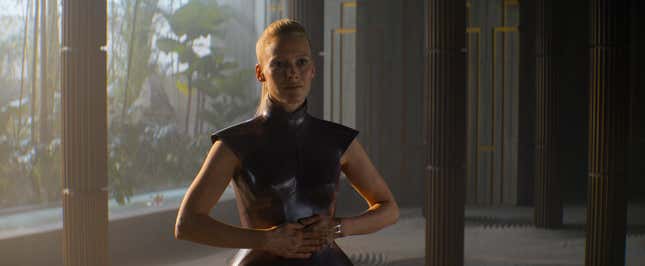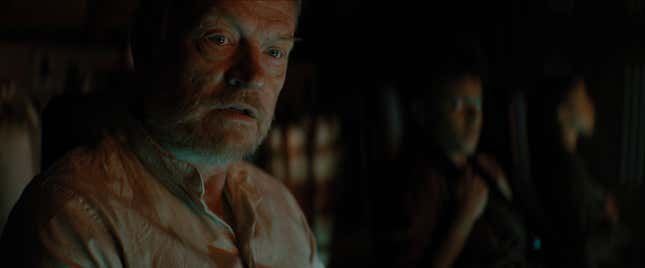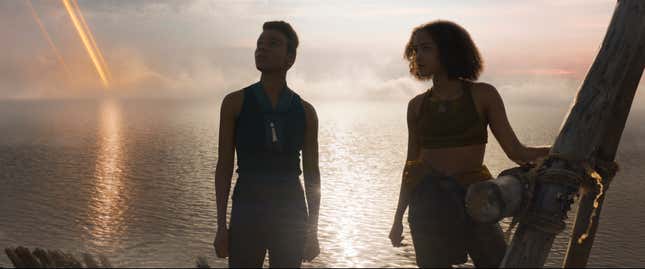Foundation season two arrives this week (here’s our catch-up on season one), which means a return to the Isaac Asimov-created sci-fi realm where math predicts the future, clones rule the galaxy, and a handful of unlikely heroes and anti-heroes do their best to keep humanity afloat. io9 got a chance to talk to showrunner and executive producer David S. Goyer about what’s in store.
Cheryl Eddy, io9: The new season widens the scope of the story quite a bit with new settings and characters. Having established the world of Foundation in season one, and with obviously a ton of source material to draw from, how did you decide which new directions to explore?
Advertisement
David S. Goyer: One of the things that you’ve alluded to was season one had a lot of heavy lifting in terms of exposition and dramatic pipelining that we had to do. It took the greater part of, I think, three episodes in season one. But all of that exposition, we already did, so I felt like we could hit the ground running with the first episode of season two. And frankly, we just had a lot more real estate to dig into the characters, both old and new. So I just didn’t feel that burden of exposition with season two that we did in season one.
io9: When I talked to you ahead of season one, you said that time was almost a character in the series because of how much the story jumped around. Season two has flashbacks and flash-forwards, but feels more linear. Was that a deliberate choice?
Advertisement
Advertisement
Goyer: Yeah, it was. We wrestled with some of the time jumps in season one and we just couldn’t figure out a way how not to embrace them; I suppose perhaps House of the Dragon had some similar things that they had to wrestle with. But season two plays out very much in a linear fashion. There are some flashbacks, but they’re traditional flashbacks and they’re not really destabilized in terms of when the story is taking place. That’s another reason that I think season two is perhaps a bit more accessible than season one was.
io9: Was that a concern with season one, that it wasn’t accessible?
Goyer: I mean, look, it wasn’t a concern. It was quite successful for Apple TV+. But, you know, as with any venture, whether you’re doing a second movie or a second series or something, you say, “are there areas where we can improve, are there areas where we can broaden the audience?” Part of that was seeing if we could tell the story in more of a linear fashion. Part of that, we’re seeing whether or not we could introduce a bit more levity into the story, whether or not we could dig deeper in terms of the characters, in terms of their love lives and things like that.
io9: There is more humor—I wouldn’t say it’s a comedy, but there’s more humor in season two, for sure. Was that a deliberate choice, or did that just come about because some of the new characters?
Goyer: That was very much a deliberate choice. There was one scene in season one where [Brother Day, one of Empire’s Cleon clones] is screaming at a statistician and he screams at him so hard that the statistician has a heart attack and dies. Everyone was very nervous about that scene when we did it—and then everyone thought it was very effective. That’s one of the things that I wish we’d done more of in season one. By no means is it a comedy, but I think the story is broad enough and big enough that you can have some moments of levity. There are certainly characters within the landscape, people like Hober Mallow, that don’t take psychohistory seriously. I think it’s important to have characters like that to challenge it, to go up against it, which is why he makes for an unlikely hero—he’s much more of a materialistic person who thinks about the now as opposed to the future.
Advertisement

io9: Asimov’s Three Laws of Robotics didn’t really get addressed in season one but are explicitly brought to the forefront in season two, especially through Demerzel, a character we get to know a lot better this season. How do you see her specifically fitting into those Three Laws, and how does Foundation subvert them in its own way?
Advertisement
Goyer: I know fans of Asimov’s work were wondering how Demerzel’s actions could be possible if she/it were beholden to the Three Laws of Robotics, or whether or not the Three Laws even existed within our show. Retroactively, Asimov made the Three Laws and robots exist within Foundation, and the Demerzel character was a character that wore many faces and had many names over the course of his various interconnected series. I’ve said in a few interviews that yes, the Three Laws do exist within Foundation the series, and that we will start to unpack those and explain to the audience why Demerzel as a whole is allowed to do the things she’s doing, even though she might appear to be beholden to those laws. If we continue the show, we’ll dig into that even further.
I told [Demerzel actor] Laura Birn when she joined the show that her character was a slow burn—we don’t get into her interior life that much in season one. And then slowly, we peel back the layers, and we get into her interior life a lot at the end of season two, in a way that I think is really effective. That’s just a storytelling tool that I find effective sometimes: to keep some characters, to keep their interior lives close to their chests and then reveal those moments later on to earn them. That was very deliberate in the case of Demerzel.
Advertisement
io9: Do you see a parallel between her influence on Empire and the way AI is influencing the world we live in now?
Goyer: Yeah, 100%. There are good ways that AI is influencing us, and there are bad ways that AI is influencing us. And the question, I guess, for Demerzel is because she/it is not a human being—can we trust Demerzel’s motivies for Empire? Or can we trust Demerzel’s motives for humanity at large? That’s one of the things that, if the show continues forward, we’ll continue to be exploring.
Advertisement
io9: Another theme that emerges in season two is how memories work, and how they can be unreliable. You can’t trust what you think is real. Why do you think memory is such a touchstone theme for science fiction as a genre?
Goyer: Well, I mean—first of all, I just like unreliable narrators. I think it’s really interesting if you’ve got characters in your story that have implanted memories, don’t know whether or not they can trust their memories, or then you have characters that might be lying about things as well, but are purporting to tell the truth. As a narrative device, that’s just something that I lean towards. But it’s one of the tropes of science fiction: implanting memories, or the ability to read memories, and we introduced this idea of memory audits. But I was also curious to explore the idea of—on one hand, the Empire seemed like this sort of monolithic organization, but on the other hand, they may be kind of prisoners within their own monolith, within their own construct. That’s something I wanted to unpack with the three Cleons this season.
Advertisement

io9: Another big theme is religion, which Foundation did touch on in season one, but takes on new importance moving forward. What can you tell us about how Hari Seldon’s image has shifted in the 138 years since we saw him last?
Advertisement
Goyer: The basis of that exists in the books; Scientism, the Church of the Galactic Spirit is something that Asimov was exploring, and that intersection between science and religion. We live in a much more polarized time than Asimov did when he was writing this. One of the things that is very top of mind today, for me at least, is the way that both science and religion are weaponized by both the right and the left. So that’s something that I was interested in exploring and interrogating in season two, and also the idea of false prophets, which is something that Asimov didn’t really deal with that much. But because our Seldon characters exist in a way [they didn’t exist in] the books, that’s something that we had available to us. The question is, when you’ve got a digitized consciousness in the form of Hari Seldon that is purporting to be acting in the best interests of humanity—well, what happens when that character becomes increasingly detached from the very people that he/it are helping or hoping to save?
io9: Do you think people will need to have seen season one in order to enjoy season two?
Advertisement
Goyer: I don’t. You know, it’s funny, I was recently told that about 30% of an audience for a season two show will not have seen the first season, so I was cognizant a little bit of reiterating certain material in the first three episodes for people that might be coming to the story anew. And I know we’ve got a couple of cool trailers that serve as a nifty kind of primer on what happened in season one. I think if you watch one of those and then dive into the season, you should be in pretty good shape. That being said, I think season two is more rewarding for people if they have watched season one.

Advertisement
io9: Season one ended on a bit of a cliffhanger. At what point in season one did you know you were going to be getting a season two? And how much did that affect the episodes?
Goyer: Because of covid and lockdown, we’d only filmed the first three episodes of season one when we shut down for about five months. And in that interim, I ended up writing, or co-writing with a few friends, the first four or five episodes of season two—so we had the interesting benefit of then going back into season one, having figured out some things further along, [and] we ended up rewriting a few things. So we knew the shape of season two before we’d even finished season one. But it wasn’t until, I think it was the third episode of season one dropped, that we got the official word from Apple TV+ that we’d be getting a second season. Hopefully a few weeks after season two drops, we’ll get similar word on season three.
Advertisement
io9: I was going to ask about that. Obviously you can’t say yet, but season two does end with another flash-forward and a cliffhanger that I’m sure you’d love to see resolved. How many seasons do you think this could go?
Goyer: Originally, about four and a half years ago, I pitched Apple eight seasons, which… maybe I’m just a glutton for punishment. If season two performs well and there’s the appetite, maybe we’ll get there. But I’m cognizant also of, if we don’t get there, are there other off ramps that I can bring the show in for a safe and satisfying landing?
Advertisement
Foundation season two premieres July 14 on Apple TV+. At 2:00 p.m. ET today, July 10, Goyer will be hosting a Q&A for fans on YouTube, here, alongside a screening of season one’s first episode.
Want more io9 news? Check out when to expect the latest Marvel, Star Wars, and Star Trek releases, what’s next for the DC Universe on film and TV, and everything you need to know about the future of Doctor Who.
Services Marketplace – Listings, Bookings & Reviews